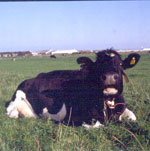 |
Generel results from DARCOF I
An important objective in setting up DARCOF was to coordinate Danish research that relates to organic farming, across institutes and disciplines. By drawing on research environments working in different disciplines it was possible to focus their unique knowledge and expertise to solve the complex problems faced in organic farming.
In 1996 six research programmes were established, involving 33 projects, 15 institutes and about 100 researchers. Together, these projects are named DARCOF I. Most of them have been concluded by the end of 1999 or 2000.
Within the individual projects a large number of relevant research results have been produced. Furthermore close collaborations have been established between the research environments and user groups, as well as between scientific teams in Denmark and in other countries.
The coordinated cooperation within particular projects has produced a high degree of synergy between different scientific disciplines. A typical example of such interdisciplinary work is the close cooperation between parasitologists, veterinarians and the more nutrition- and production-oriented environments associated with pig production systems. Another example is the collaboration between biologically orientated and plant production research environments within DARCOF. An important aspect of interdisciplinary collaboration is the use of joint research facilities and workshop areas, which can provide common orientation and a common source of information across the project boundaries.
Main results
Plant production
The studies relating to plant production have provided new information on the opportunities for establishing organic plant production systems that build on a higher degree of nitrogen fixation and better nutrient utilisation than currently the case. This is for instance significant for the establishment of production systems that use low inputs of animal manure.
These options are suggested by new information on the fixation of nitrogen by legumes, the nitrogen dynamics of rotations, and the prevention of losses of different nutrients by the appropriate use of rotations and catch crops. Furthermore, new knowledge about soil fertility in relation to tillage practices and in relation to the interplay between micro-organisms, soil fauna and other factors, increases the options for developing organic production systems that are in closer harmony with the natural conditions.
Similarly, the options for stabilising organic rotations have been greatly enhanced by the development of tillage systems that prevent weed problems. A new basis for R&D activities has also been established which will secure better plant health and improved quality in plant products.
Animal production
The research has also helped reveal options for establishing organic systems that promote the health and welfare of farm animals, while taking due regard to their impact on the environment and the economy of production.
Especially for pigs, the research has shown possibilities for organic production that safeguard the relationships between feeding principles and crop rotations, and which promote animal health through the prevention of disease, infectious micro-organisms, and parasites. In this context the studies have revealed considerable opportunities for producing cattle and pigs together. And research in the production of pigs for slaughter has established new perspectives for the arrangement of outdoor facilities that satisfy the behavioural and health requirements of pigs, while also reducing the loss of nutrients.
Particularly in poultry production, the research has shown that it is possible to promote animal health and welfare in organic, free-range systems through appropriate breeding initiatives.
Nature and the environment
The research effort has greatly helped establish a wider recognition of the options available in organic farming to protect nature and the environment. It has thus laid the foundations for a development of organic farming, where greater regard to the interests of the environment and natural assets is taken in the production process.
DARCOF research has also provided a better understanding of the importance of cultivated soil as the biological basis for protecting environmental and natural assets. Research in this area has already produced a more refined but general understanding of how nature affects agricultural production and how farming practices can influence nature and environmental conditions.
Long-term effects of organic farming
In future years, the establishment of DARCOF's research facilities will make it possible to follow the long-term effects of organic farming, such as the effects on soil and plant quality, nutrient dynamics, microbial activity and soil fertility.
Communication and research development
Finally, DARCOF has summarised the results obtained in the research projects, made knowledge syntheses, and communicated this information. These coordinated activities have helped strengthen the knowledge basis for organic farming.
The establishment of DARCOF's research projects has promoted a widespread understanding of organic farming amongst the different research environments and institutes involved. This has produced respect for this area of research and a solid basis for the initiation of new R&D activities. Scientists in DARCOF have contributed to a range of training and course activities, and this has led to the education of researchers with competence in the area of organic farming.
|